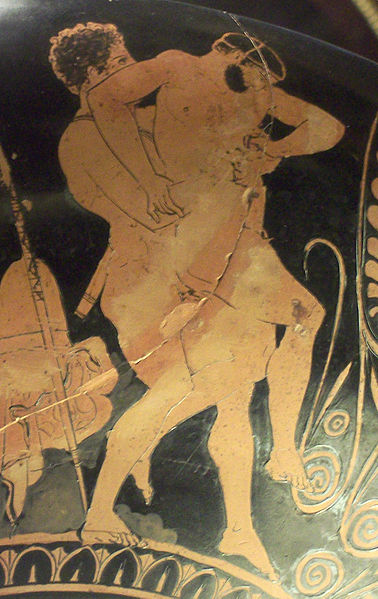CERCYON IN GREEK MYTHOLOGY
Cercyon was a mortal king from Greek mythology. A king of Eleusis, Cercyon was most famous for his encounter with the Greek hero Theseus.
Cercyon King of Eleusis
Eleusis was an important place in Ancient Greece famed for its link to the Eleusinian Mysteries, but it was also a kingdom, which at one point was ruled by Cerycon.
Cercyon was a mortal king born to exalted parents, although amongst ancient sources there is no consensus about who the parents were. Most commonly Cercyon is named as a son of Poseidon, born to a daughter of King Amphicyton of Athens, or alternatively Cercyon was a son of a different Olympian god, Hephaestus.
As an alternative some say Cercyon was the son of Apollo’s lover Brachus and the nymph Argiope.
Cercyon was a mortal king born to exalted parents, although amongst ancient sources there is no consensus about who the parents were. Most commonly Cercyon is named as a son of Poseidon, born to a daughter of King Amphicyton of Athens, or alternatively Cercyon was a son of a different Olympian god, Hephaestus.
As an alternative some say Cercyon was the son of Apollo’s lover Brachus and the nymph Argiope.
The Cruelty of Cercyon
|
Cercyon would become known for his cruelty, a trait exhibited when he had his own daughter put to death.
His daughter, Alope, had become pregnant by the god Poseidon, when Poseidon transformed himself into a kingfisher. Alope has sought to hide her pregnancy and subsequently her son born of the god. Alope had had her son exposed, although the son, later called Hippothoon, had survived. |
|
Alope’s secret was exposed when her rescued baby was brought to Cercyon’s court, with the king recognising the cloth in which he was wrapped.
Cercyon would have Alope buried alive.
Cercyon would have Alope buried alive.
Cercyon and Theseus
|
Knowledge of Cercyon’s cruelty would spread far and wide, though for Cercyon became infamous for putting unwary travellers to death.
The king would challenge strangers to hand-to-hand combat, with strangers offered no alternative but to accept the challenge. Cercyon would offer a prize for those who could best him; his own kingdom, but those who lost would be put to death. Cercyon though possed enormous strenght, and so was never bested. Theseus though, came to Eleusis during is travels around the Saronic Gulf, and for the fifth of his Six Labours, Theseus fought with Cercyon. Theseus would eventually beat Cercyon, for although the king was stronger, Theseus fought with skill, finally lifting the king up, and throwing him to the ground, killing him. Theseus was therefore said to have invented the sport of wrestling. |
Theseus was said by some to have then slept with the daughters of Cercyon, although others say that Alope was the king’s only daughter.
Having beaten Cercyon, Theseus could have become king of Eleusis, but it was commonly said that he gave the throne to Hippothoon, when King Cercyon’s grandson identified himself as a son of Poseidon; doe Theseus himself was also said to be a son of the sea god.
Having beaten Cercyon, Theseus could have become king of Eleusis, but it was commonly said that he gave the throne to Hippothoon, when King Cercyon’s grandson identified himself as a son of Poseidon; doe Theseus himself was also said to be a son of the sea god.
|
|
Colin Quartermain - Cercyon - 6th February 2021
